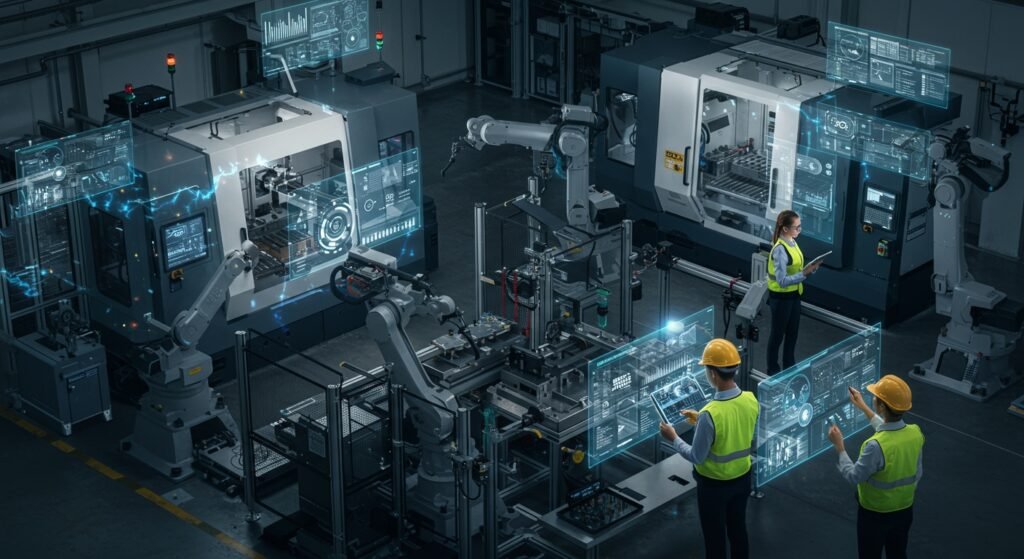The landscape of global manufacturing is undergoing a profound transformation, driven by the advent of smart manufacturing. This paradigm shift, often referred to as Industry 4.0, integrates advanced technologies like artificial intelligence, IoT, and robotics to create highly efficient, interconnected, and responsive production systems. At the heart of optimizing these complex systems lies the critical discipline of Industrial Engineering in Smart Manufacturing. Industrial engineers, traditionally focused on improving processes, systems, and organizations, are now indispensable in designing, implementing, and refining the factories of the future.
Table of Contents
- Introduction
- The Pivotal Role of Industrial Engineering in Smart Manufacturing
- Key Principles Guiding Smart Manufacturing
- How Industrial Engineers Drive Efficiency and Innovation
- Enabling Technologies for Modern Industrial Engineers
- Navigating Challenges and Envisioning the Future
- Conclusion
The Pivotal Role of Industrial Engineering in Smart Manufacturing
Industrial engineers are uniquely positioned to bridge the gap between technological innovation and practical application within smart factories. Their expertise in systems thinking, process optimization, and human factors is crucial for harnessing the full potential of interconnected machinery and data streams. By applying analytical methods and design principles, industrial engineers ensure that smart manufacturing systems are not only technologically advanced but also highly efficient, cost-effective, and adaptable. They are instrumental in streamlining workflows, enhancing productivity, and improving the overall quality of production processes, making Industrial Engineering in Smart Manufacturing a cornerstone of its success.
Optimizing Production Flows with Data
In smart manufacturing environments, vast amounts of data are generated from sensors, machines, and various stages of the production line. Industrial engineers leverage this data to identify bottlenecks, predict equipment failures, and optimize material flow in real-time. Techniques such as value stream mapping and simulation modeling are re-imagined with digital twins and predictive analytics, allowing for more precise and dynamic optimization than ever before.
Integrating Human-Machine Collaboration
While automation is a hallmark of smart manufacturing, the human element remains vital. Industrial engineers play a crucial role in designing interfaces, workflows, and training programs that facilitate seamless collaboration between human operators and advanced robotic systems. This focus ensures that new technologies enhance rather than complicate human tasks, leading to improved safety, reduced errors, and greater job satisfaction.
Key Principles Guiding Smart Manufacturing
Smart manufacturing operates on several core principles that industrial engineers help to implement and manage:
- Interoperability: The ability of machines, devices, sensors, and people to connect and communicate with each other.
- Decentralization: The capability of cyber-physical systems to make decisions on their own.
- Real-time Capability: The ability to collect and analyze data instantly for immediate decision-making.
- Modularity: Flexible adaptation of production systems to changing requirements through modular components.
How Industrial Engineers Drive Efficiency and Innovation
Industrial engineers are vital in translating smart manufacturing principles into tangible operational improvements. They develop strategies for supply chain optimization, ensuring that the flow of materials and information is as efficient as the production process itself. Through ergonomic design and workplace layout, they enhance productivity and safety for human workers operating alongside automated systems. Furthermore, their analytical skills are essential for performance measurement and continuous improvement initiatives, guaranteeing that smart factories evolve and adapt to new demands. For more insights into foundational strategies, explore our guide on Understanding Lean Manufacturing Principles.
Enabling Technologies for Modern Industrial Engineers
The toolkit for industrial engineers has expanded dramatically with the rise of smart manufacturing:
AI and Machine Learning
AI algorithms are used for predictive maintenance, quality control, and demand forecasting, allowing industrial engineers to preemptively address issues and optimize resource allocation.
Internet of Things (IoT)
IoT devices provide real-time data from every corner of the factory floor, offering unprecedented visibility into operations and enabling more informed decision-making by industrial engineers.
Robotics and Automation
Advanced robotics not only handle repetitive and hazardous tasks but also work collaboratively with humans, requiring industrial engineers to design efficient human-robot interaction systems.
Comparative Overview: Traditional vs. Smart Manufacturing
| Feature | Traditional Manufacturing | Smart Manufacturing |
|---|---|---|
| Data Collection | Manual, periodic | Automated, real-time via IoT |
| Decision Making | Hierarchical, human-centric | Decentralized, data-driven, AI-assisted |
| Flexibility | Rigid, high changeover cost | Highly adaptable, modular systems |
| Process Control | Reactive, often after errors | Proactive, predictive, self-optimizing |
| Workforce Role | Manual labor, oversight | Supervision, system design, problem-solving |
Navigating Challenges and Envisioning the Future
While the benefits of smart manufacturing are immense, industrial engineers also face significant challenges. These include the substantial initial investment required for new technologies, the need for a highly skilled workforce, and ensuring robust cybersecurity. The future of Industrial Engineering in Smart Manufacturing will involve continuous adaptation to emerging technologies, focusing on sustainable production, and further integrating the digital and physical worlds. Staying abreast of developments is key for professionals in this field. For further reading on Industry 4.0’s broader impact, consider this resource: World Economic Forum on Industry 4.0.
Conclusion
The synergy between industrial engineering and smart manufacturing is undeniable. Industrial engineers are not merely adapting to new technologies; they are actively shaping the future of production. Their unique ability to analyze complex systems, optimize processes, and integrate human factors makes them indispensable in unlocking the full potential of Industry 4.0. As manufacturing continues its digital evolution, the demand for skilled industrial engineers who can navigate and lead this transformation will only grow, solidifying their role as architects of the next industrial era.


